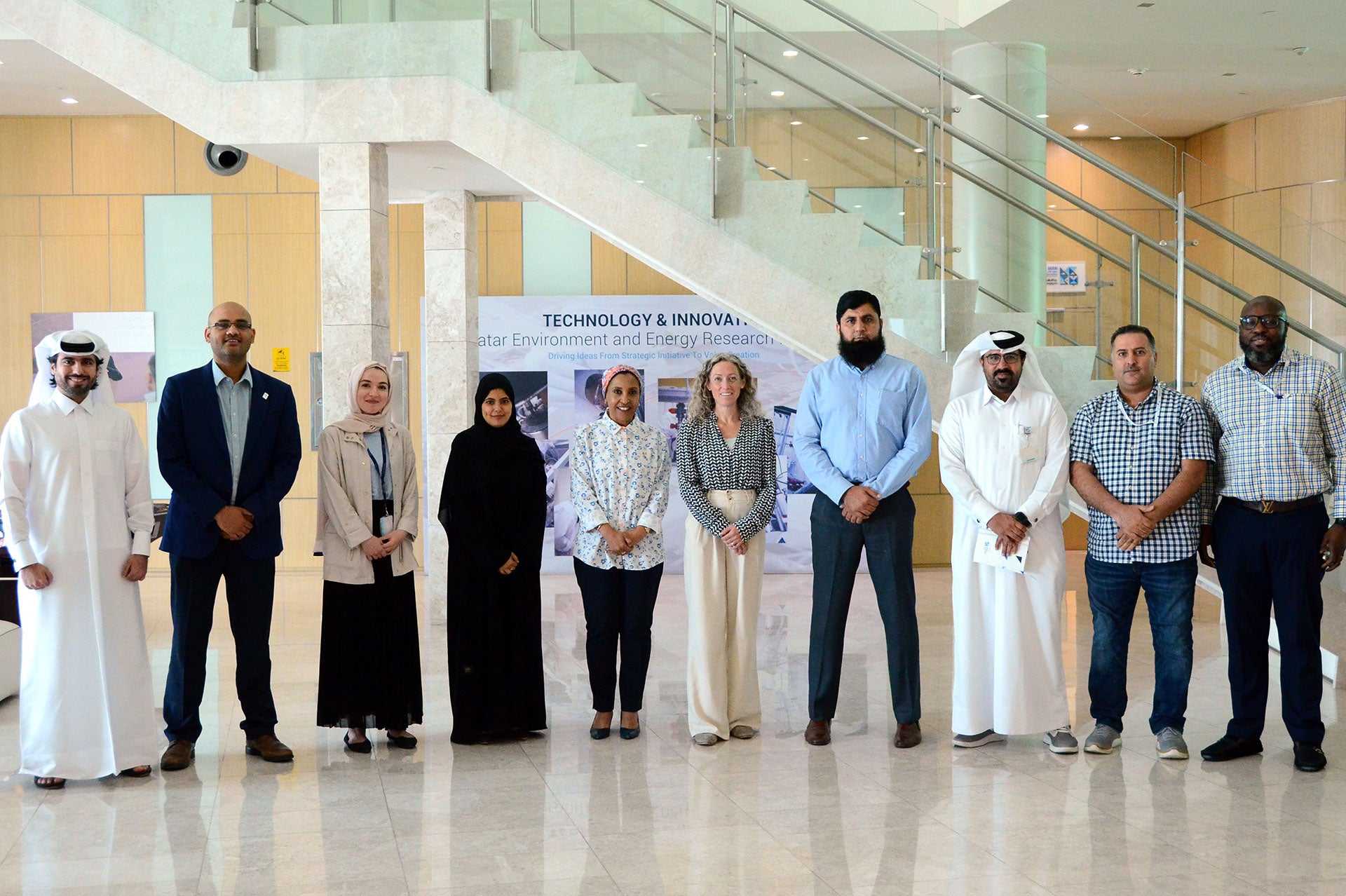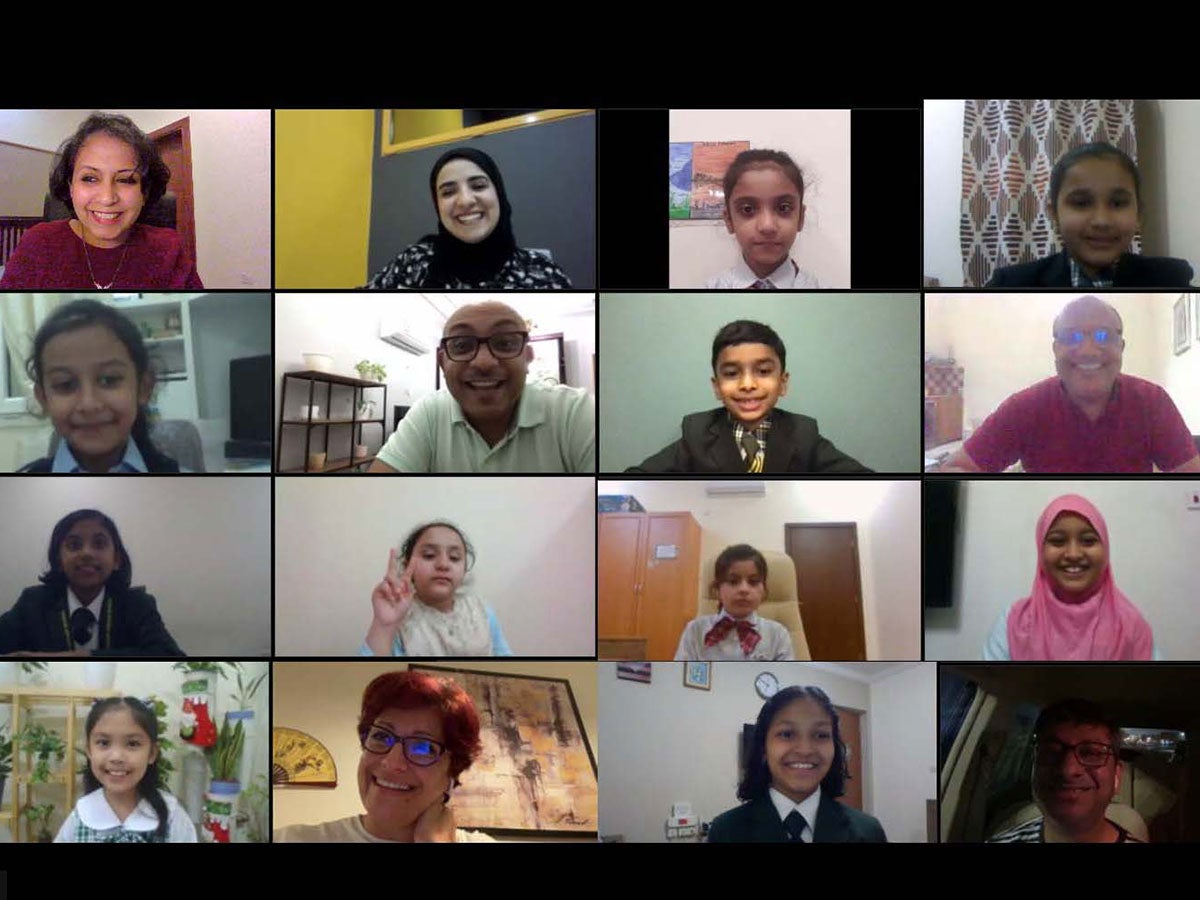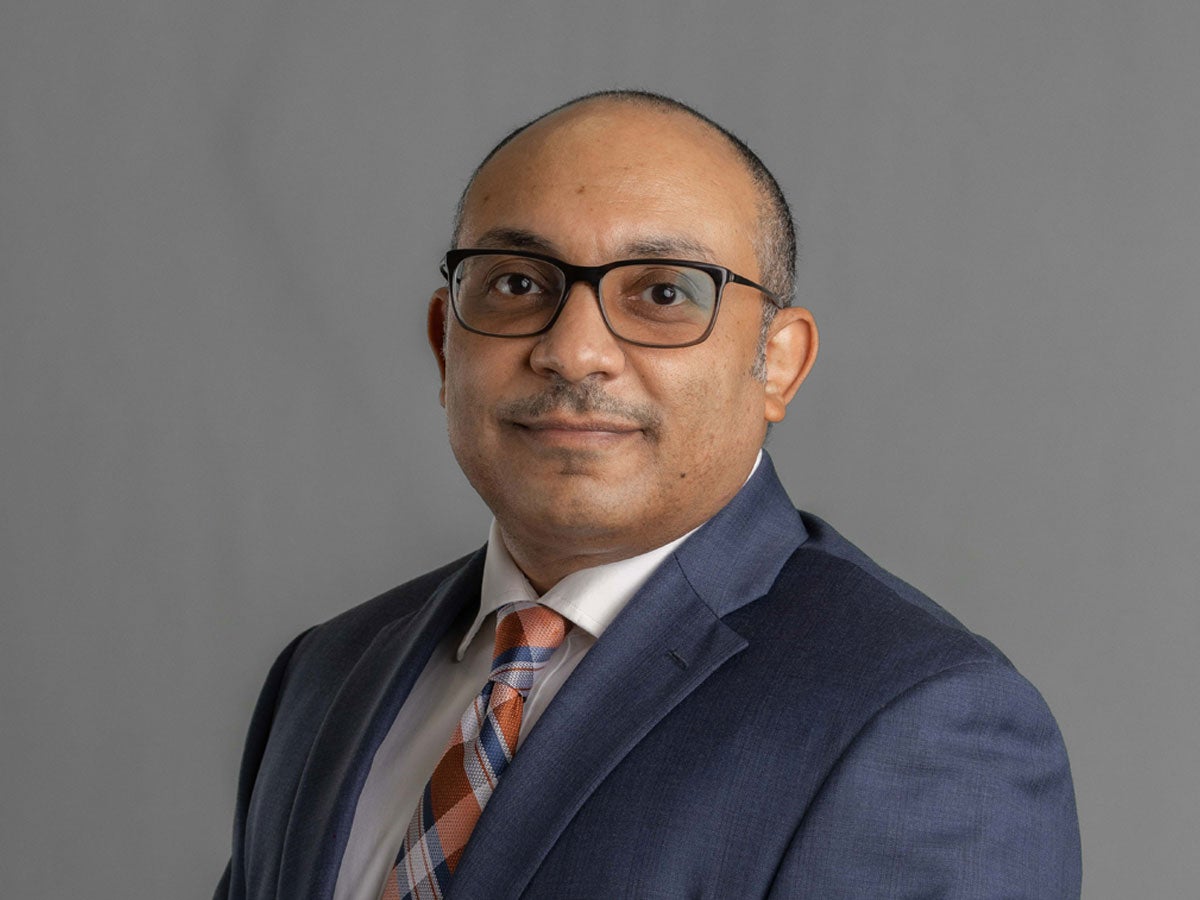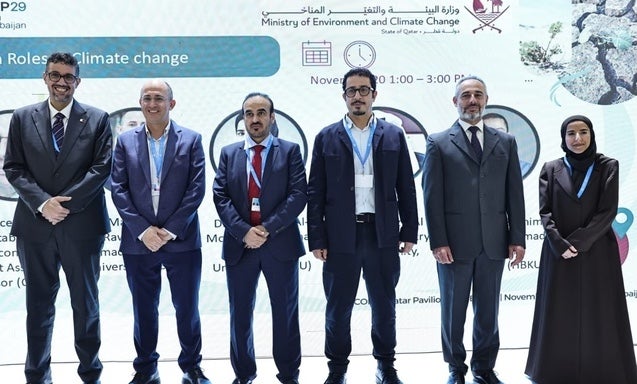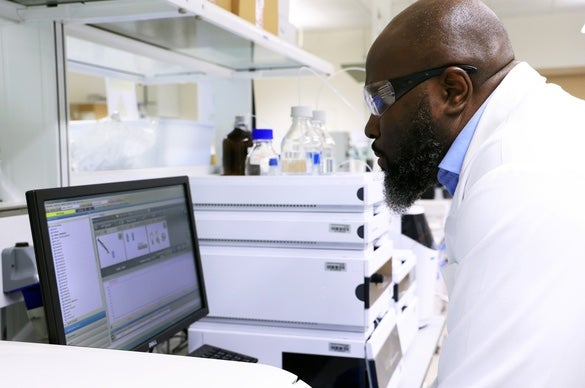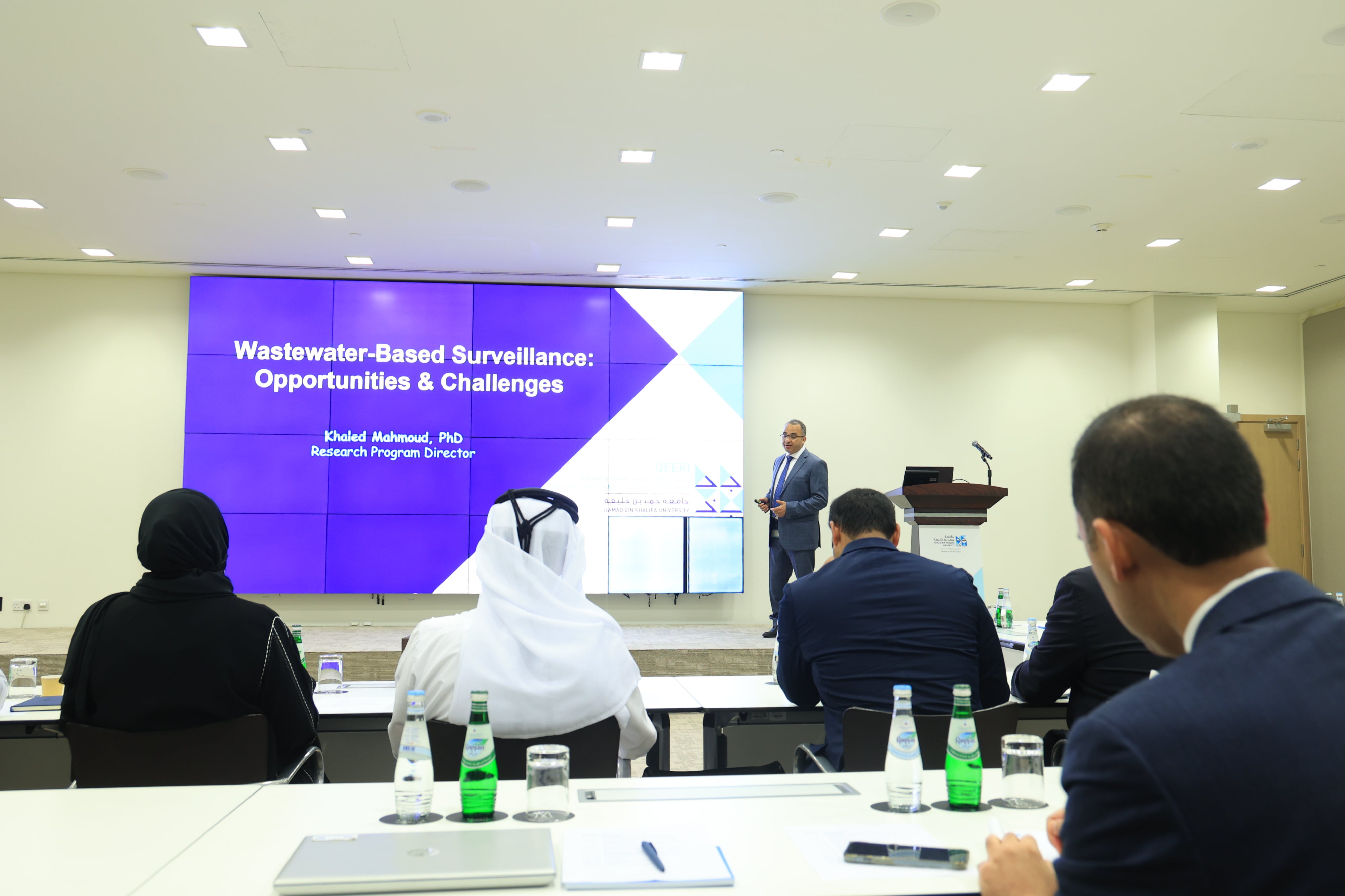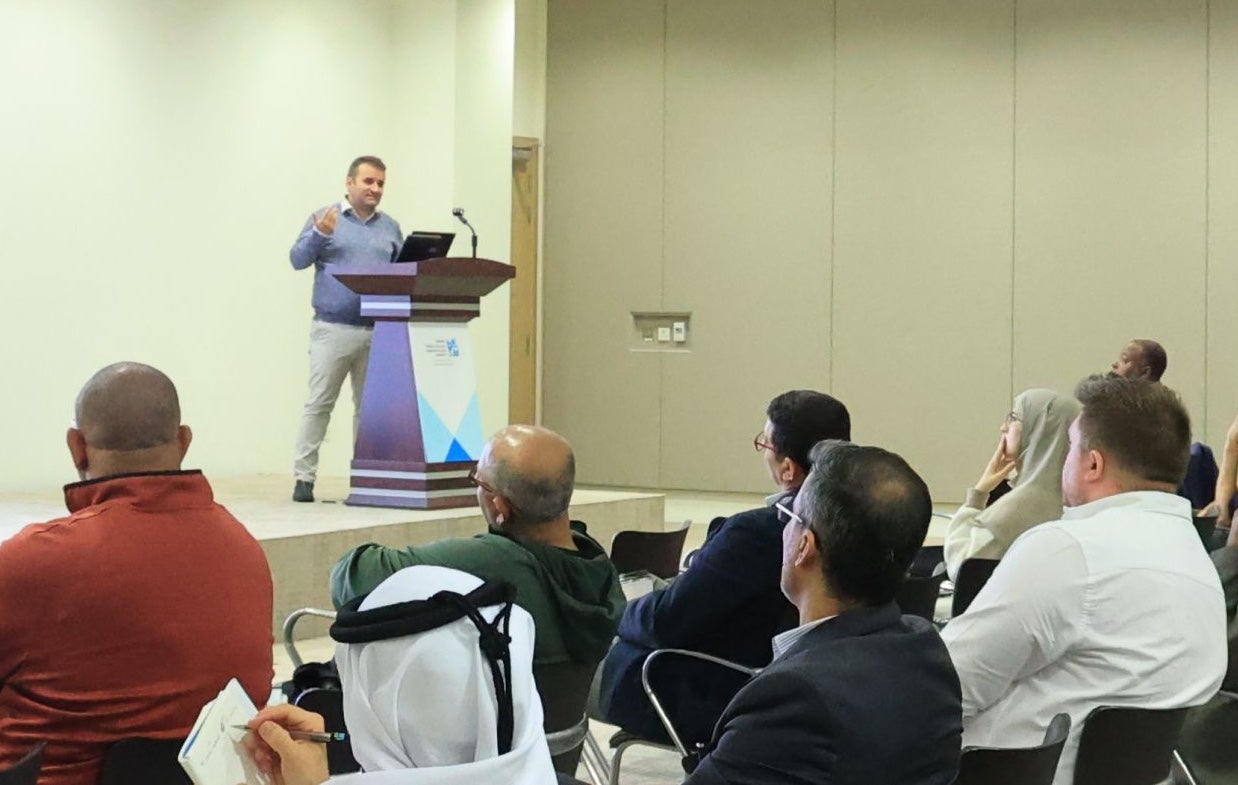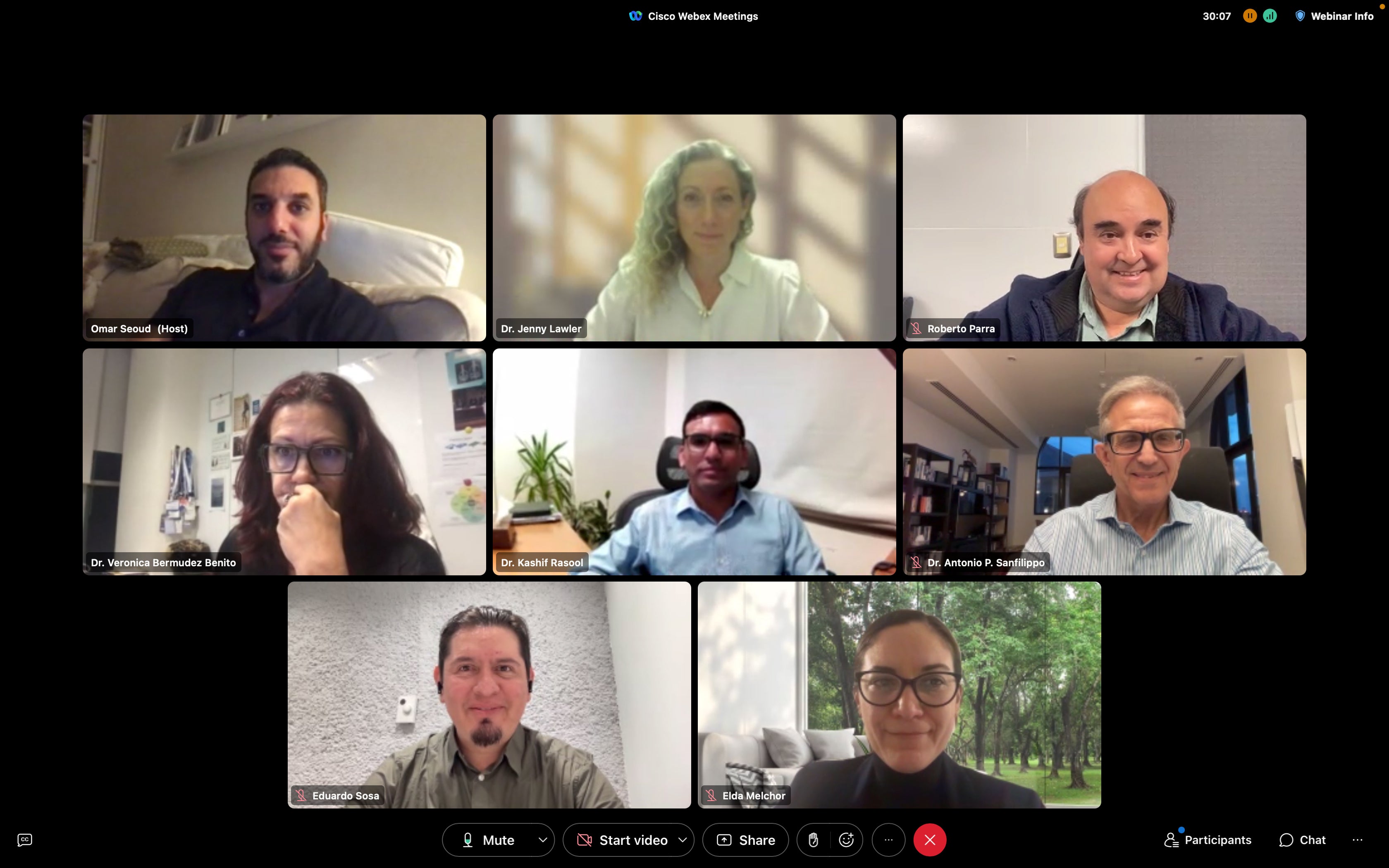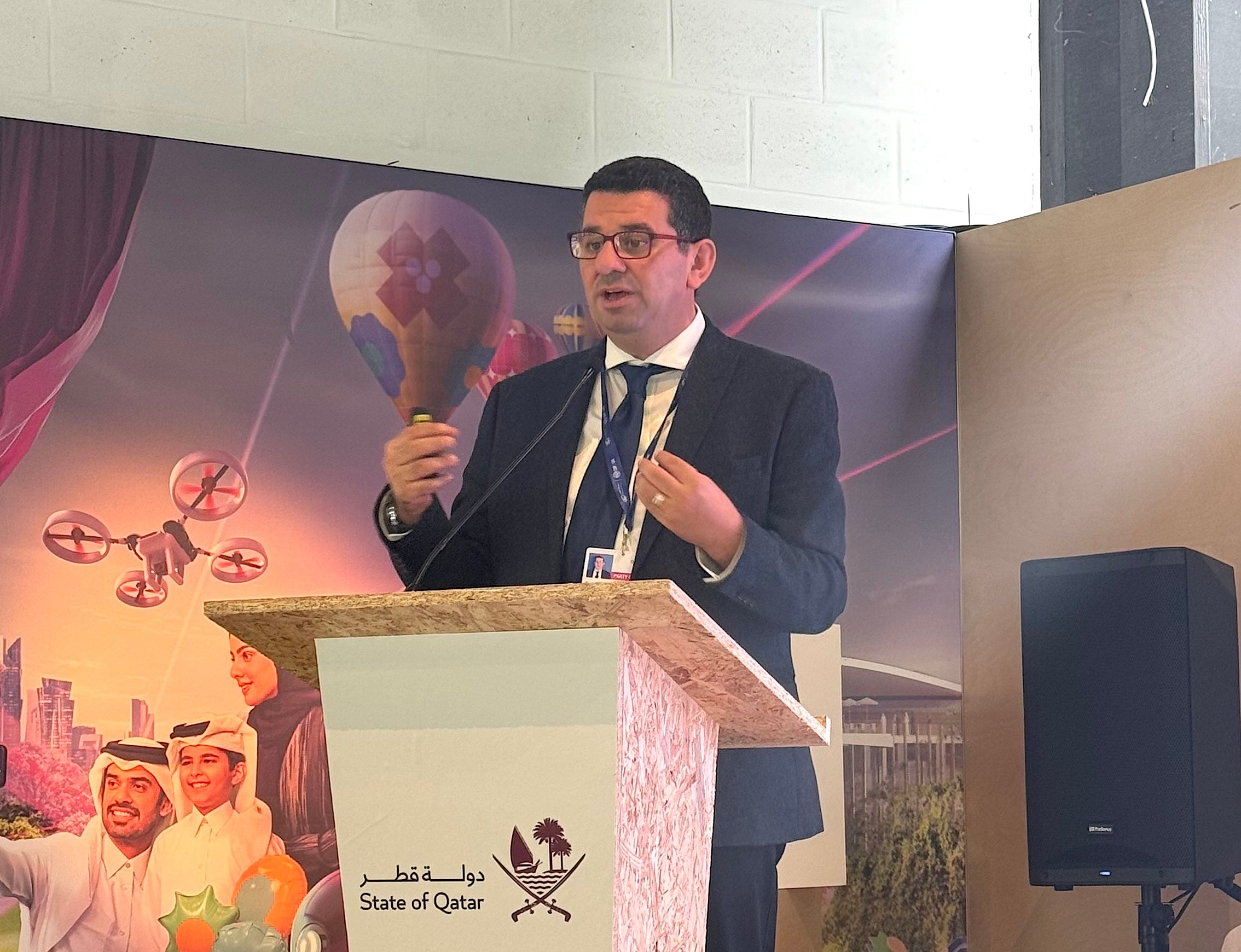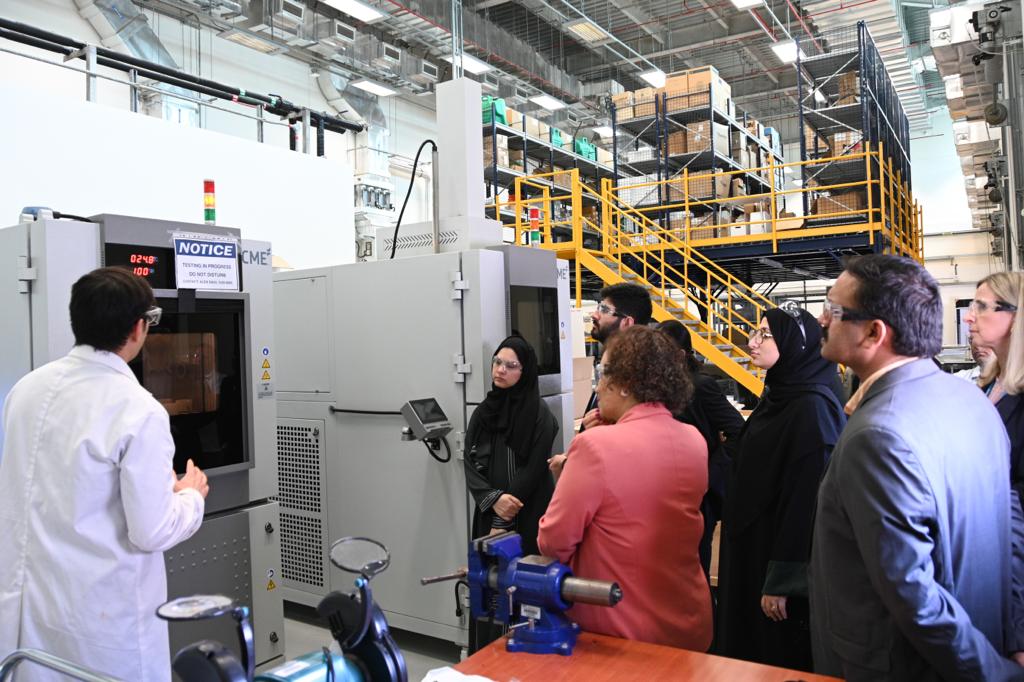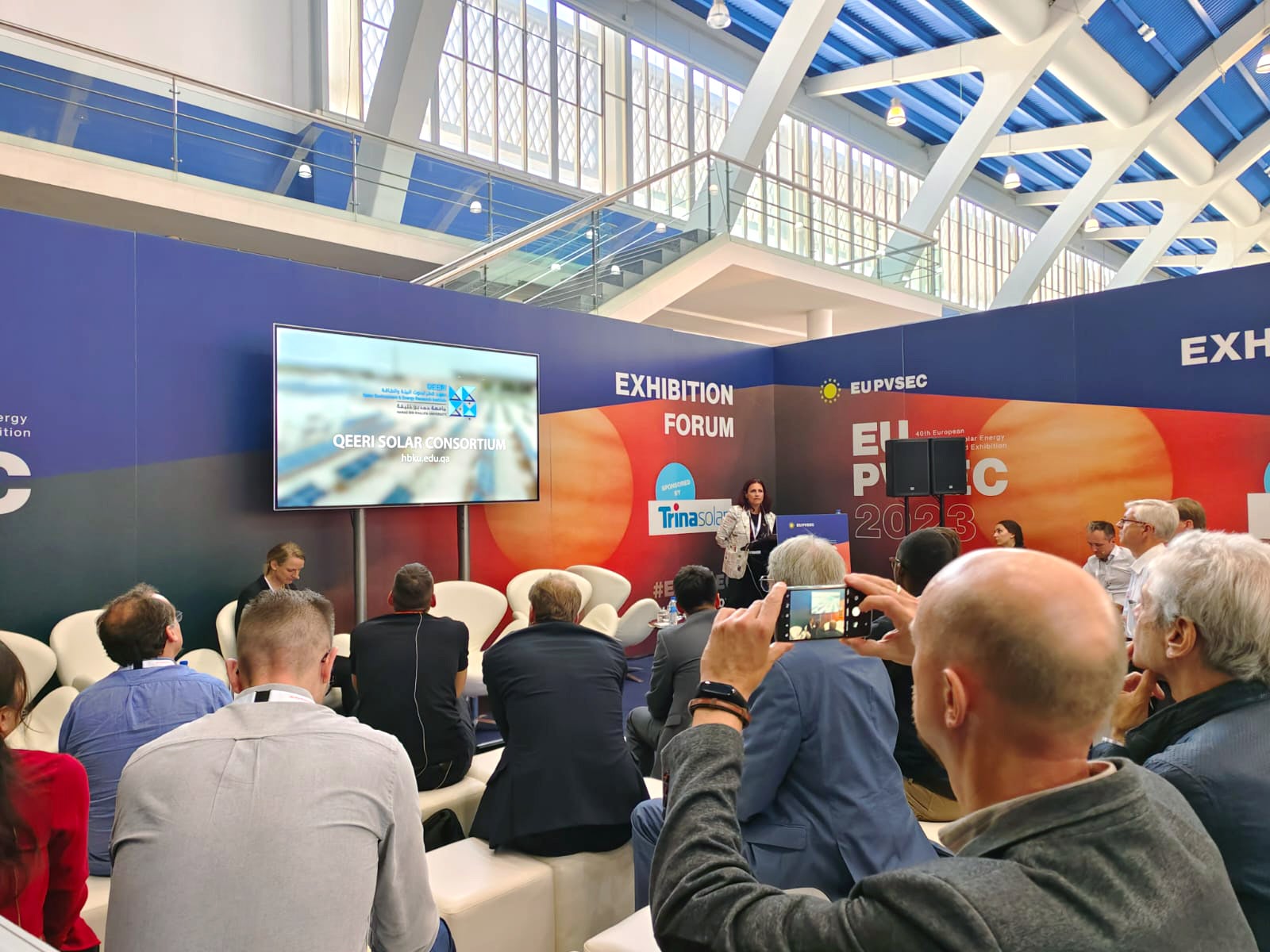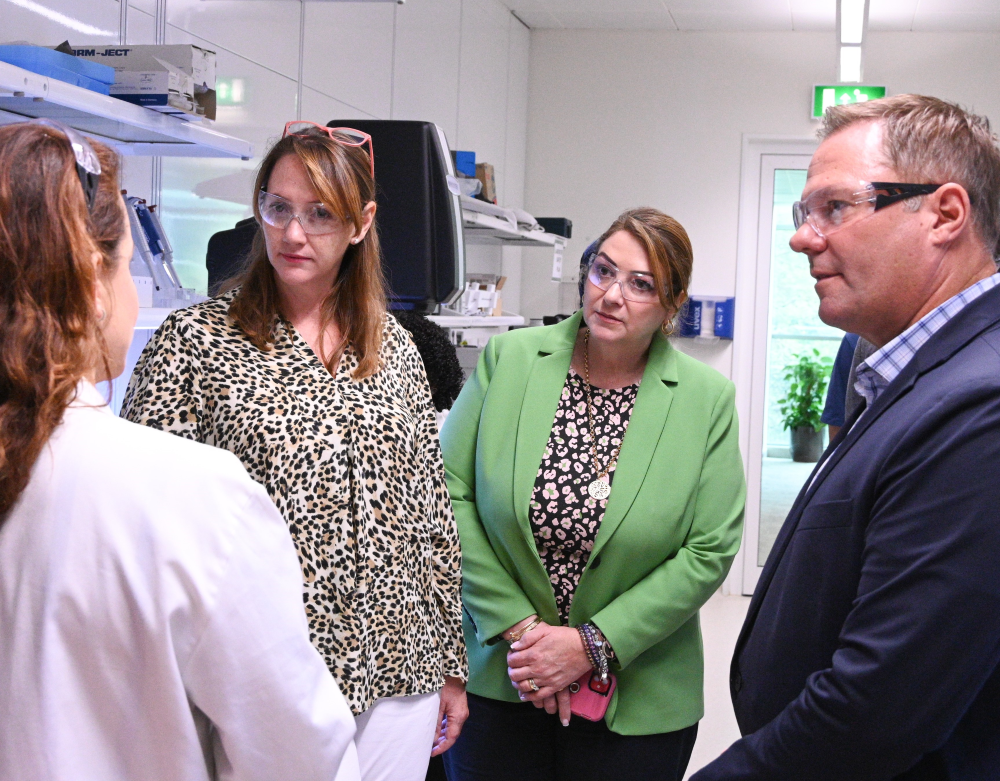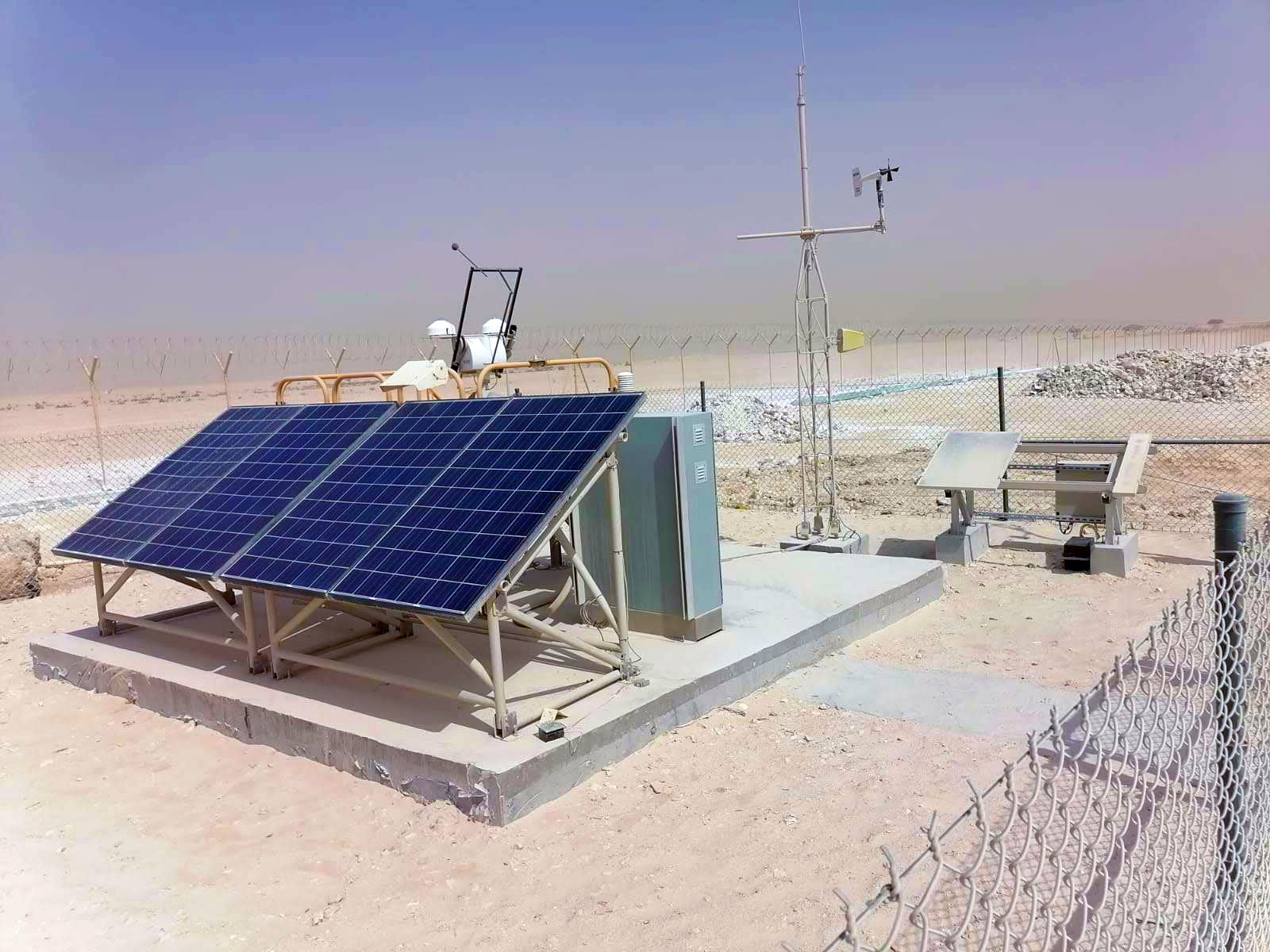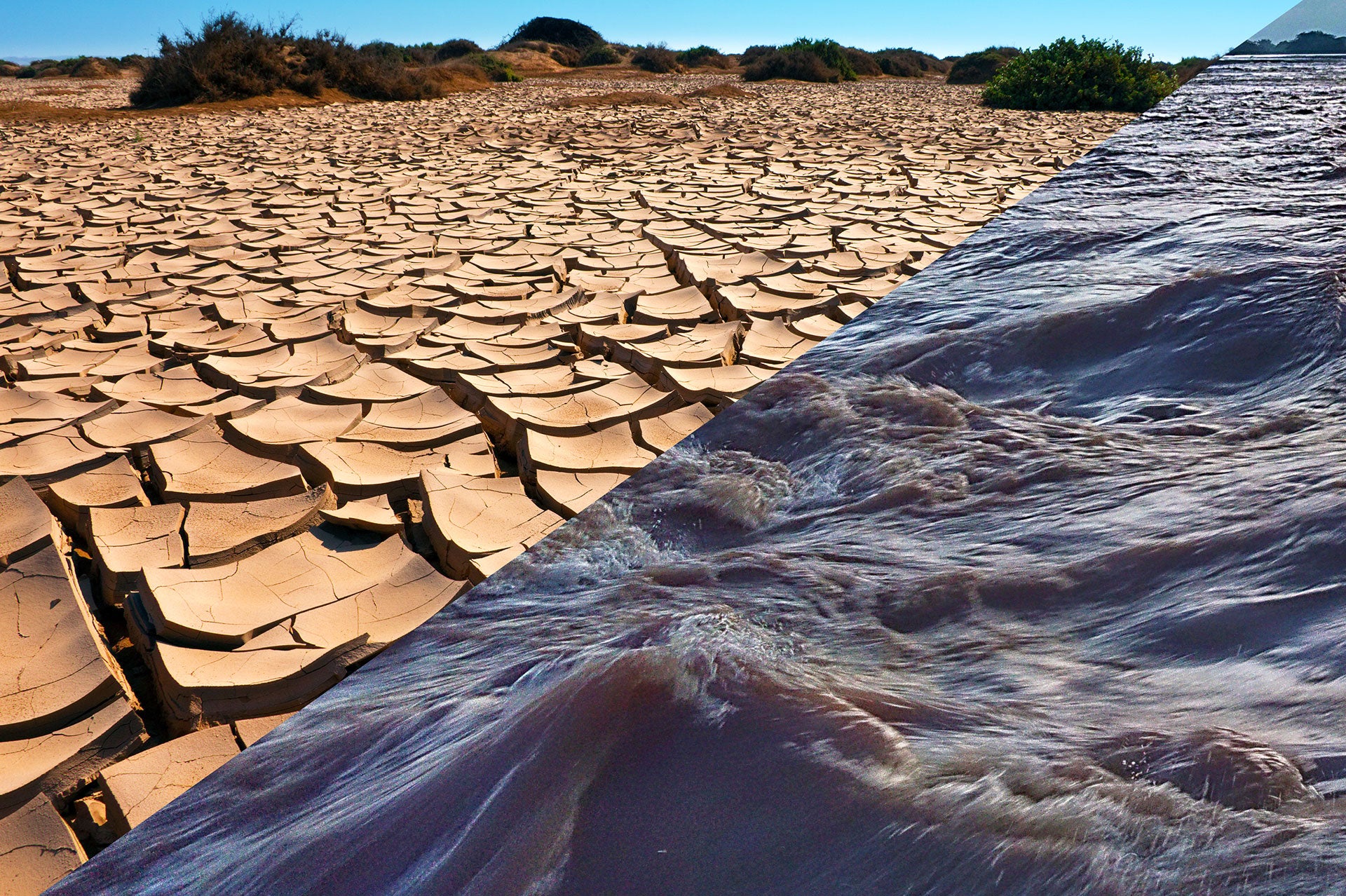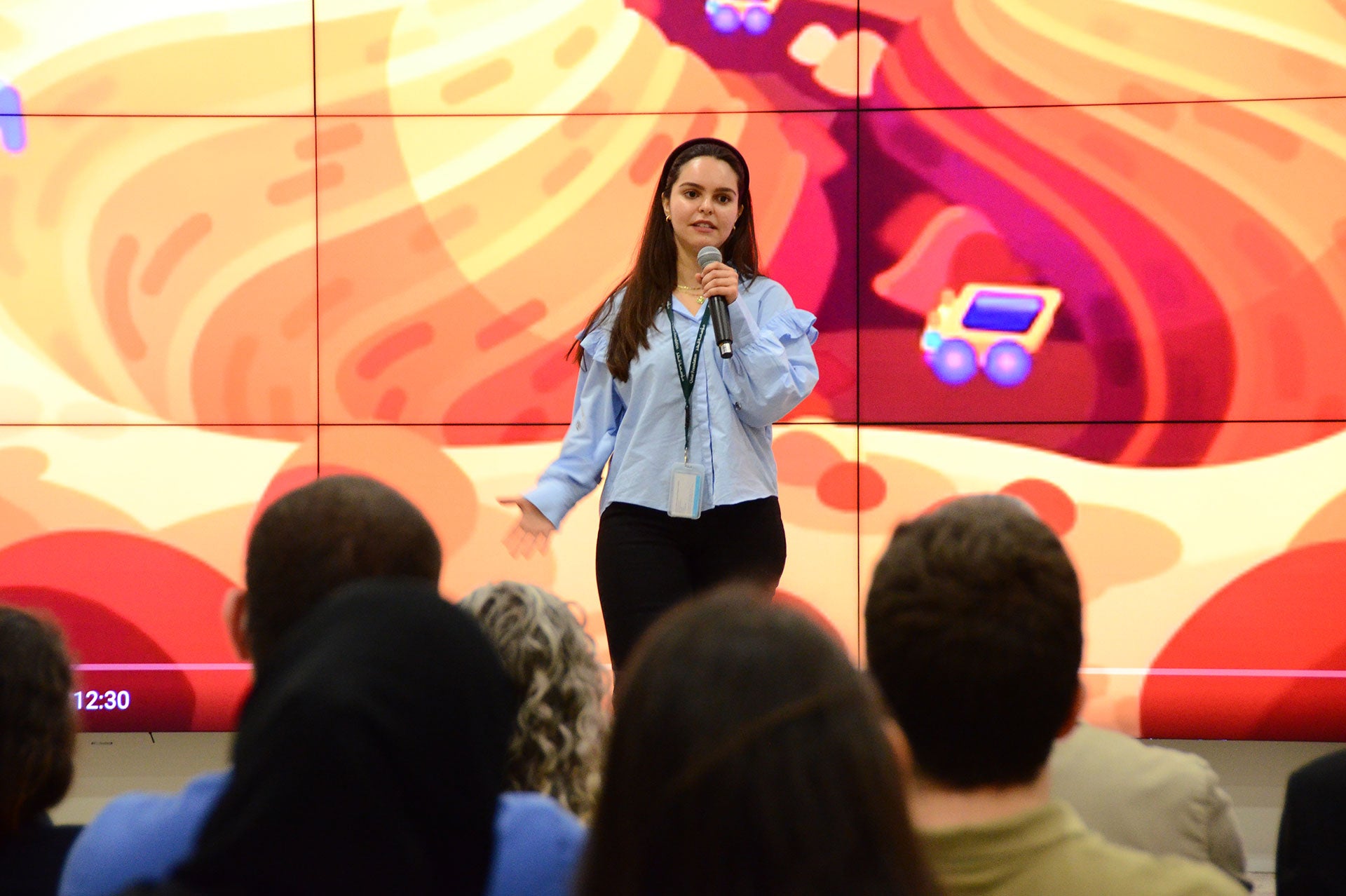
QEERI Event Focuses on Collaborative Air Quality Research
Workshop connects researchers and lays groundwork for joint research studies
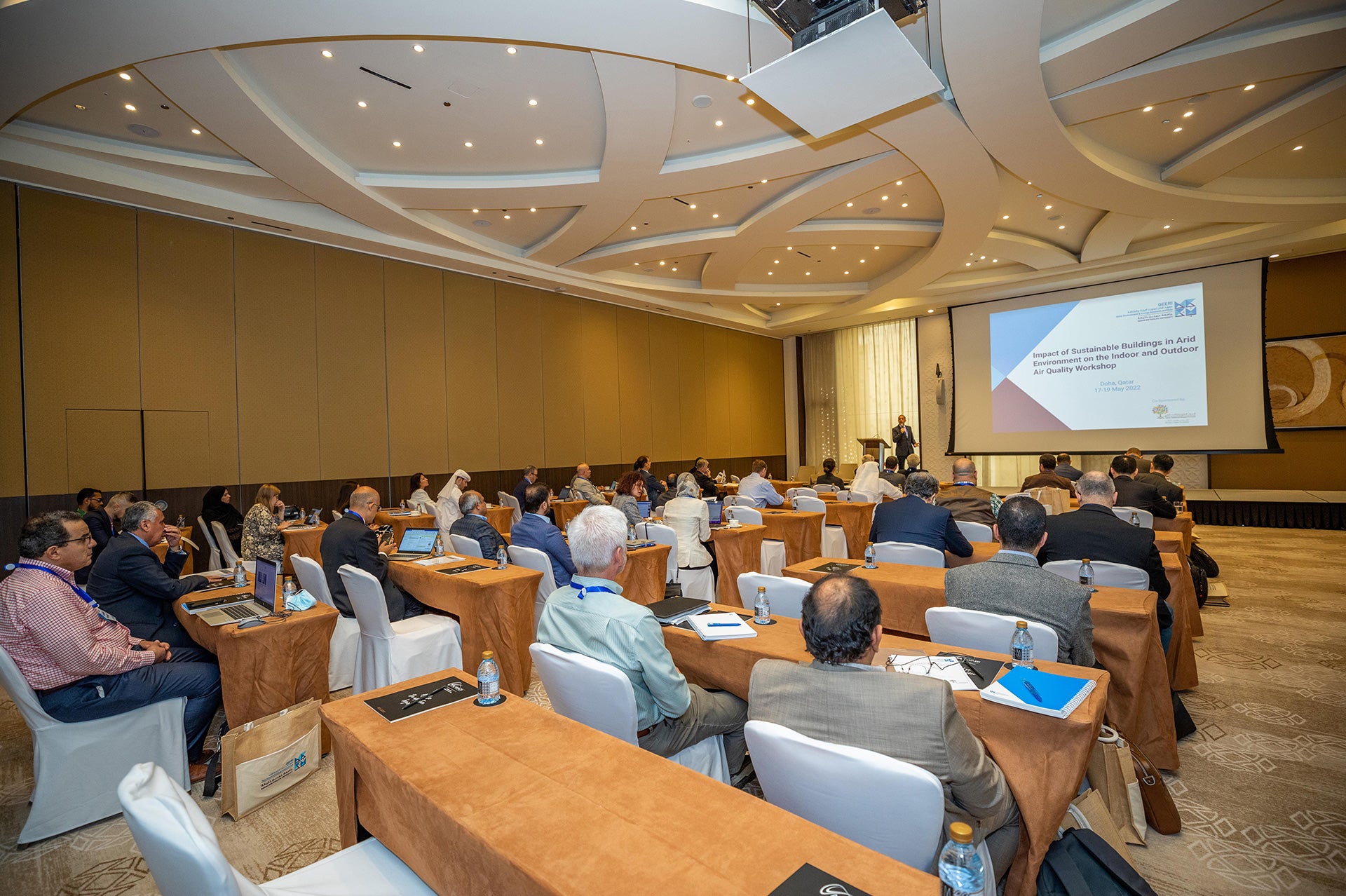
Qatar Environment and Energy Research Institute (QEERI), a member of Hamad Bin Khalifa University (HBKU), convened a three-day workshop titled “The Impact of Sustainable Buildings in Arid Environments: Indoor and Outdoor Air Quality”. Co-organized with the City College of New York (CUNY) and sponsored by Qatar National Research Fund (QNRF). The workshop brought together nearly 60 Qatar-based and international attendees. They represented 24 local and international research and government entities.
The workshop aimed to provide a premier interdisciplinary platform for local researchers and enablers to exchange knowledge with leading international practitioners and subject matter experts in the fields of sustainable buildings, air quality, and the urban heat island phenomena.
The outcome-driven workshop included breakout sessions where participants engaged in brainstorming discussions guided by facilitators. The focus was on how to drive impact in Qatar by examining the current research landscape and identifying collaborative research opportunities.
Dr. AbdlMonem H. Beitelmal, Principal Scientist at QEERI, who led the event, said: “We had an excellent turnout throughout the three days and participants with diverse yet complimentary backgrounds. Overall, the workshop outcomes are very promising, and we are very satisfied with the results. We are collectively working to further the outcomes into tangible and practical results in the near future.”
Commenting on the importance of the workshop, Dr. Marc Vermeersch, Executive Director of QEERI, said: “Such events align with our core objectives aimed at managing the common sustainability challenges facing urban environments in hot arid regions, particularly the research and technology development requirements. Nationally, our Environment and Sustainability Center’s air quality research program is furthering Qatar’s capabilities in air quality management, with a focus on human health. To ensure the reach and intended impact of our work, collaboration is absolutely crucial. The workshop established grounds for further cooperation and knowledge sharing at a regional and global level.”
Prof. Jorge E. Gonzalez, Presidential Professor of City College of New York, added: “I was pleased to attend this timely workshop on indoor and outdoor air quality, and most importantly, the impact on the health of populations. The forum was extremely meaningful with potential impact on society and science. We proposed an agenda that aims to deliver impactful results, on both a local and global scale, towards issues related to climate change mitigation and adaptations in semi-arid and arid environments, which is a significant endeavor for a society to achieve. Through such workshops, QEERI is putting itself in a leading position in these emerging fields and I look forward to many outcomes.”
Potential workshop outcomes span short and long-term projects. A prospective collaborative study to be led by QEERI will consider the impact of almost doubling Qatar’s population during the FIFA World CupTM. With over 1.5 million fans expected, the study will look into the effects on the country’s vital urban elements, such as mobility and the local environment.
QEERI will continue to lead workshops and research efforts. That includes three proposals under QNRF’s National Priorities Research Program (NPRP-15) and a potential research cluster project, with international and local participants in livable, smart, and healthy city initiatives.
QEERI’s Environment and Sustainability Center aims to assess, enable, and develop national environmental solutions to address challenges in air/water quality and climate change through sustainable societal, economic, and governance research. For more information, please visit qeeri.hbku.edu.qa
Related News
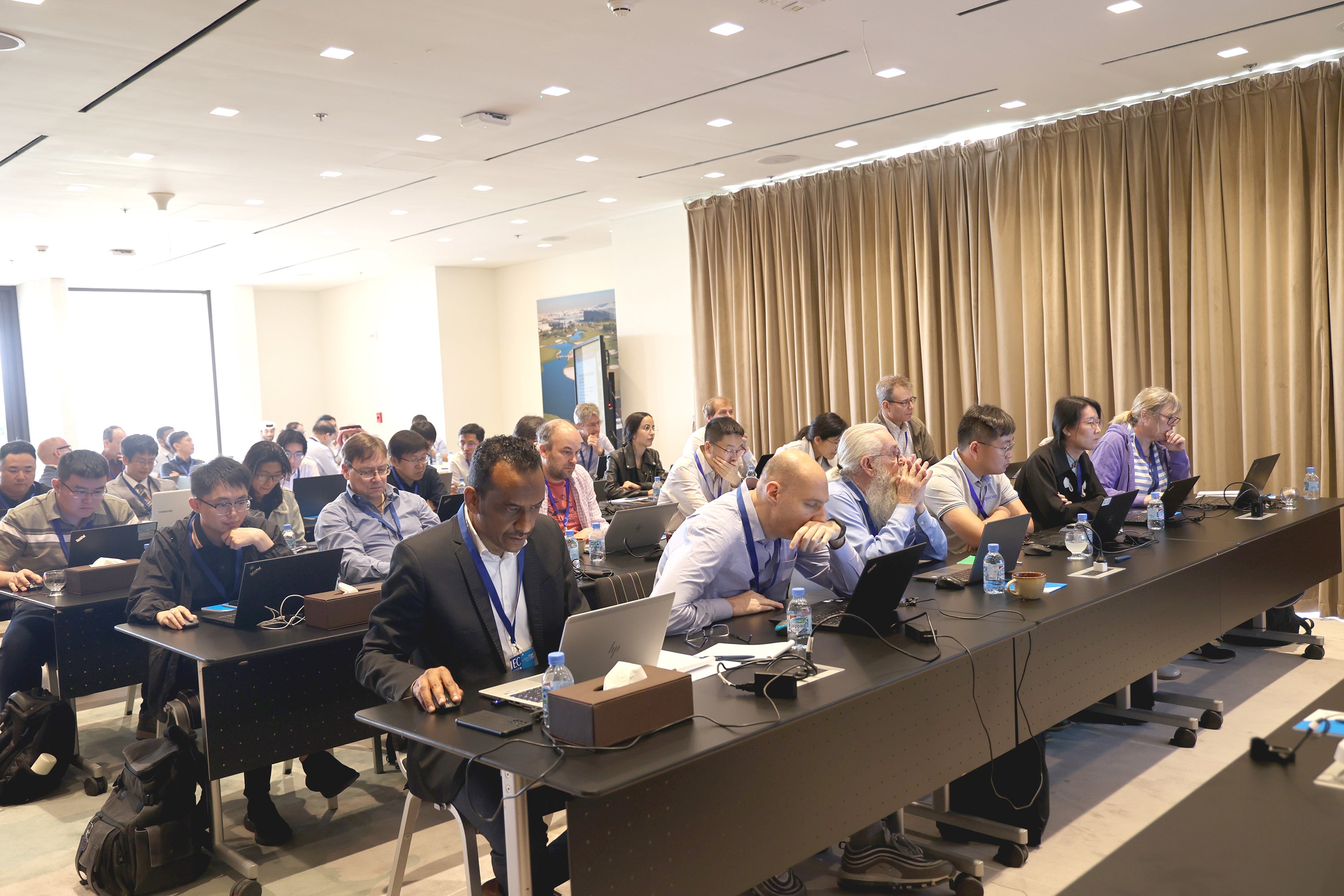
QEERI Hosts Meetings to Advance International Standards for Photovoltaic Modules
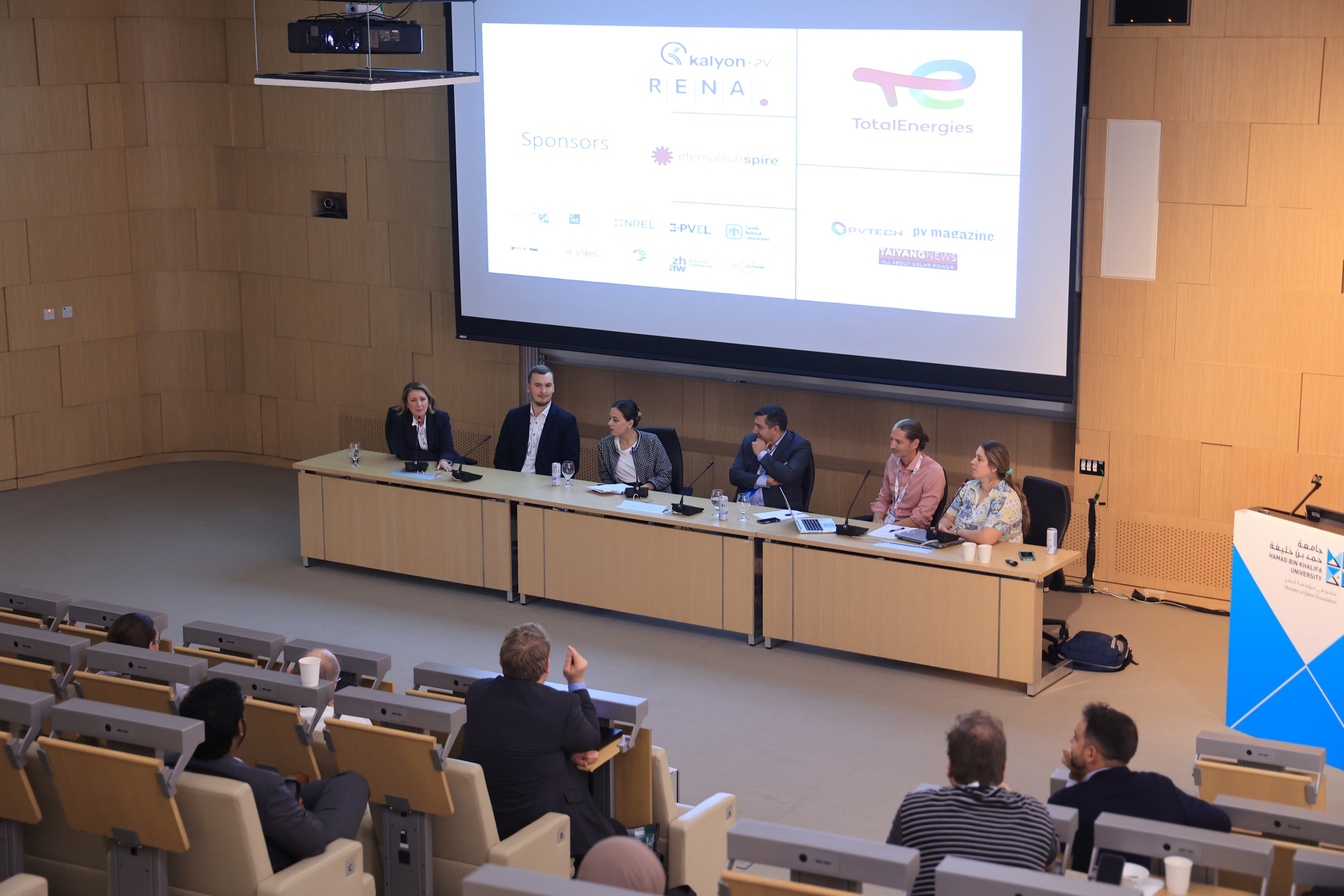
HBKU’s QEERI Hosts the 10th Bifacial Photovoltaic Workshop focused on desert technologies
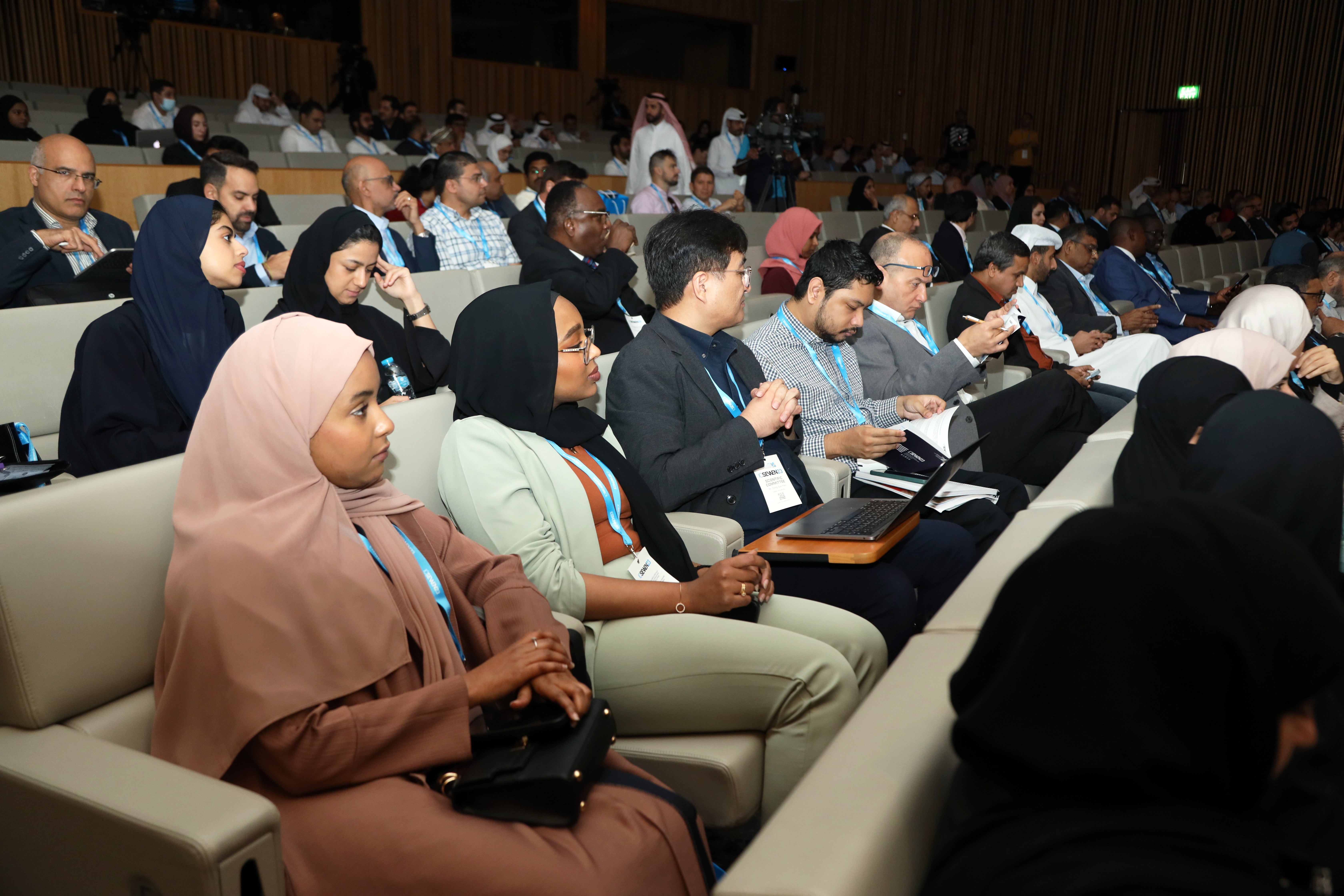
HBKU’s QEERI Concludes ICSEWEN23, Announces Winners, and Unveils Environmental Insights
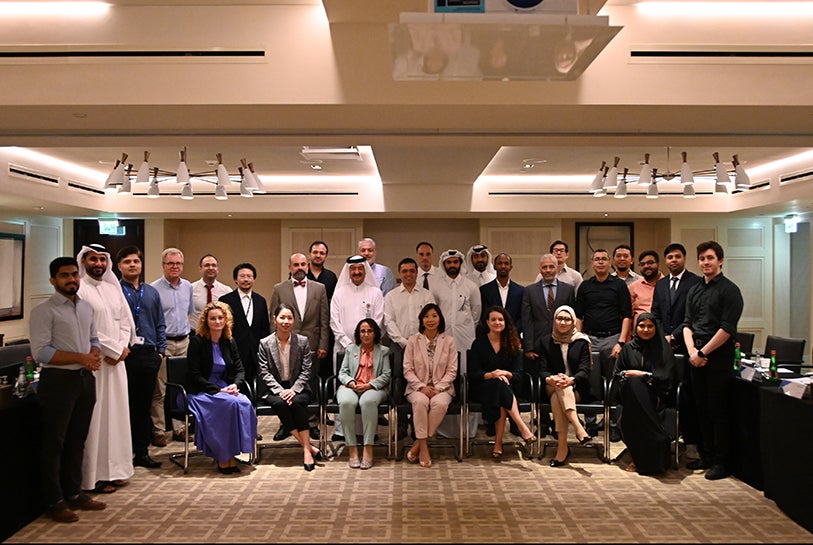
QEERI Corrosion Center Renews Strong Ties with Industry Partners and Stakeholders

QEERI Hosts Meetings to Advance International Standards for Photovoltaic Modules

HBKU’s QEERI Hosts the 10th Bifacial Photovoltaic Workshop focused on desert technologies

HBKU’s QEERI Concludes ICSEWEN23, Announces Winners, and Unveils Environmental Insights

QEERI Corrosion Center Renews Strong Ties with Industry Partners and Stakeholders

QEERI Hosts Meetings to Advance International Standards for Photovoltaic Modules

HBKU’s QEERI Hosts the 10th Bifacial Photovoltaic Workshop focused on desert technologies

HBKU’s QEERI Concludes ICSEWEN23, Announces Winners, and Unveils Environmental Insights

QEERI Corrosion Center Renews Strong Ties with Industry Partners and Stakeholders

QEERI Hosts Meetings to Advance International Standards for Photovoltaic Modules

HBKU’s QEERI Hosts the 10th Bifacial Photovoltaic Workshop focused on desert technologies

HBKU’s QEERI Concludes ICSEWEN23, Announces Winners, and Unveils Environmental Insights

QEERI Corrosion Center Renews Strong Ties with Industry Partners and Stakeholders

QEERI Hosts Meetings to Advance International Standards for Photovoltaic Modules

HBKU’s QEERI Hosts the 10th Bifacial Photovoltaic Workshop focused on desert technologies

HBKU’s QEERI Concludes ICSEWEN23, Announces Winners, and Unveils Environmental Insights

QEERI Corrosion Center Renews Strong Ties with Industry Partners and Stakeholders

QEERI Hosts Meetings to Advance International Standards for Photovoltaic Modules

HBKU’s QEERI Hosts the 10th Bifacial Photovoltaic Workshop focused on desert technologies

HBKU’s QEERI Concludes ICSEWEN23, Announces Winners, and Unveils Environmental Insights

QEERI Corrosion Center Renews Strong Ties with Industry Partners and Stakeholders

QEERI Hosts Meetings to Advance International Standards for Photovoltaic Modules

HBKU’s QEERI Hosts the 10th Bifacial Photovoltaic Workshop focused on desert technologies

HBKU’s QEERI Concludes ICSEWEN23, Announces Winners, and Unveils Environmental Insights

QEERI Corrosion Center Renews Strong Ties with Industry Partners and Stakeholders

QEERI Hosts Meetings to Advance International Standards for Photovoltaic Modules

HBKU’s QEERI Hosts the 10th Bifacial Photovoltaic Workshop focused on desert technologies

HBKU’s QEERI Concludes ICSEWEN23, Announces Winners, and Unveils Environmental Insights

QEERI Corrosion Center Renews Strong Ties with Industry Partners and Stakeholders

QEERI Hosts Meetings to Advance International Standards for Photovoltaic Modules

HBKU’s QEERI Hosts the 10th Bifacial Photovoltaic Workshop focused on desert technologies

HBKU’s QEERI Concludes ICSEWEN23, Announces Winners, and Unveils Environmental Insights

QEERI Corrosion Center Renews Strong Ties with Industry Partners and Stakeholders

QEERI Hosts Meetings to Advance International Standards for Photovoltaic Modules

HBKU’s QEERI Hosts the 10th Bifacial Photovoltaic Workshop focused on desert technologies

HBKU’s QEERI Concludes ICSEWEN23, Announces Winners, and Unveils Environmental Insights

QEERI Corrosion Center Renews Strong Ties with Industry Partners and Stakeholders

QEERI Hosts Meetings to Advance International Standards for Photovoltaic Modules

HBKU’s QEERI Hosts the 10th Bifacial Photovoltaic Workshop focused on desert technologies

HBKU’s QEERI Concludes ICSEWEN23, Announces Winners, and Unveils Environmental Insights

QEERI Corrosion Center Renews Strong Ties with Industry Partners and Stakeholders

QEERI Hosts Meetings to Advance International Standards for Photovoltaic Modules

HBKU’s QEERI Hosts the 10th Bifacial Photovoltaic Workshop focused on desert technologies

HBKU’s QEERI Concludes ICSEWEN23, Announces Winners, and Unveils Environmental Insights

QEERI Corrosion Center Renews Strong Ties with Industry Partners and Stakeholders

QEERI Hosts Meetings to Advance International Standards for Photovoltaic Modules

HBKU’s QEERI Hosts the 10th Bifacial Photovoltaic Workshop focused on desert technologies

HBKU’s QEERI Concludes ICSEWEN23, Announces Winners, and Unveils Environmental Insights

QEERI Corrosion Center Renews Strong Ties with Industry Partners and Stakeholders

QEERI Hosts Meetings to Advance International Standards for Photovoltaic Modules

HBKU’s QEERI Hosts the 10th Bifacial Photovoltaic Workshop focused on desert technologies

HBKU’s QEERI Concludes ICSEWEN23, Announces Winners, and Unveils Environmental Insights

QEERI Corrosion Center Renews Strong Ties with Industry Partners and Stakeholders

QEERI Hosts Meetings to Advance International Standards for Photovoltaic Modules

HBKU’s QEERI Hosts the 10th Bifacial Photovoltaic Workshop focused on desert technologies

HBKU’s QEERI Concludes ICSEWEN23, Announces Winners, and Unveils Environmental Insights

QEERI Corrosion Center Renews Strong Ties with Industry Partners and Stakeholders

QEERI Hosts Meetings to Advance International Standards for Photovoltaic Modules

HBKU’s QEERI Hosts the 10th Bifacial Photovoltaic Workshop focused on desert technologies

HBKU’s QEERI Concludes ICSEWEN23, Announces Winners, and Unveils Environmental Insights

QEERI Corrosion Center Renews Strong Ties with Industry Partners and Stakeholders

QEERI Hosts Meetings to Advance International Standards for Photovoltaic Modules

HBKU’s QEERI Hosts the 10th Bifacial Photovoltaic Workshop focused on desert technologies

HBKU’s QEERI Concludes ICSEWEN23, Announces Winners, and Unveils Environmental Insights

QEERI Corrosion Center Renews Strong Ties with Industry Partners and Stakeholders

QEERI Hosts Meetings to Advance International Standards for Photovoltaic Modules

HBKU’s QEERI Hosts the 10th Bifacial Photovoltaic Workshop focused on desert technologies

HBKU’s QEERI Concludes ICSEWEN23, Announces Winners, and Unveils Environmental Insights

QEERI Corrosion Center Renews Strong Ties with Industry Partners and Stakeholders

QEERI Hosts Meetings to Advance International Standards for Photovoltaic Modules

HBKU’s QEERI Hosts the 10th Bifacial Photovoltaic Workshop focused on desert technologies

HBKU’s QEERI Concludes ICSEWEN23, Announces Winners, and Unveils Environmental Insights

QEERI Corrosion Center Renews Strong Ties with Industry Partners and Stakeholders

QEERI Hosts Meetings to Advance International Standards for Photovoltaic Modules

HBKU’s QEERI Hosts the 10th Bifacial Photovoltaic Workshop focused on desert technologies

HBKU’s QEERI Concludes ICSEWEN23, Announces Winners, and Unveils Environmental Insights

QEERI Corrosion Center Renews Strong Ties with Industry Partners and Stakeholders

QEERI Hosts Meetings to Advance International Standards for Photovoltaic Modules

HBKU’s QEERI Hosts the 10th Bifacial Photovoltaic Workshop focused on desert technologies

HBKU’s QEERI Concludes ICSEWEN23, Announces Winners, and Unveils Environmental Insights

QEERI Corrosion Center Renews Strong Ties with Industry Partners and Stakeholders

QEERI Hosts Meetings to Advance International Standards for Photovoltaic Modules

HBKU’s QEERI Hosts the 10th Bifacial Photovoltaic Workshop focused on desert technologies

HBKU’s QEERI Concludes ICSEWEN23, Announces Winners, and Unveils Environmental Insights

QEERI Corrosion Center Renews Strong Ties with Industry Partners and Stakeholders

QEERI Hosts Meetings to Advance International Standards for Photovoltaic Modules

HBKU’s QEERI Hosts the 10th Bifacial Photovoltaic Workshop focused on desert technologies

HBKU’s QEERI Concludes ICSEWEN23, Announces Winners, and Unveils Environmental Insights

QEERI Corrosion Center Renews Strong Ties with Industry Partners and Stakeholders

QEERI Hosts Meetings to Advance International Standards for Photovoltaic Modules

HBKU’s QEERI Hosts the 10th Bifacial Photovoltaic Workshop focused on desert technologies

HBKU’s QEERI Concludes ICSEWEN23, Announces Winners, and Unveils Environmental Insights

QEERI Corrosion Center Renews Strong Ties with Industry Partners and Stakeholders

QEERI Hosts Meetings to Advance International Standards for Photovoltaic Modules

HBKU’s QEERI Hosts the 10th Bifacial Photovoltaic Workshop focused on desert technologies

HBKU’s QEERI Concludes ICSEWEN23, Announces Winners, and Unveils Environmental Insights

QEERI Corrosion Center Renews Strong Ties with Industry Partners and Stakeholders

QEERI Hosts Meetings to Advance International Standards for Photovoltaic Modules

HBKU’s QEERI Hosts the 10th Bifacial Photovoltaic Workshop focused on desert technologies

HBKU’s QEERI Concludes ICSEWEN23, Announces Winners, and Unveils Environmental Insights

QEERI Corrosion Center Renews Strong Ties with Industry Partners and Stakeholders

QEERI Hosts Meetings to Advance International Standards for Photovoltaic Modules

HBKU’s QEERI Hosts the 10th Bifacial Photovoltaic Workshop focused on desert technologies

HBKU’s QEERI Concludes ICSEWEN23, Announces Winners, and Unveils Environmental Insights

QEERI Corrosion Center Renews Strong Ties with Industry Partners and Stakeholders

QEERI Hosts Meetings to Advance International Standards for Photovoltaic Modules

HBKU’s QEERI Hosts the 10th Bifacial Photovoltaic Workshop focused on desert technologies

HBKU’s QEERI Concludes ICSEWEN23, Announces Winners, and Unveils Environmental Insights

QEERI Corrosion Center Renews Strong Ties with Industry Partners and Stakeholders

QEERI Hosts Meetings to Advance International Standards for Photovoltaic Modules

HBKU’s QEERI Hosts the 10th Bifacial Photovoltaic Workshop focused on desert technologies

HBKU’s QEERI Concludes ICSEWEN23, Announces Winners, and Unveils Environmental Insights

QEERI Corrosion Center Renews Strong Ties with Industry Partners and Stakeholders

QEERI Hosts Meetings to Advance International Standards for Photovoltaic Modules

HBKU’s QEERI Hosts the 10th Bifacial Photovoltaic Workshop focused on desert technologies

HBKU’s QEERI Concludes ICSEWEN23, Announces Winners, and Unveils Environmental Insights

QEERI Corrosion Center Renews Strong Ties with Industry Partners and Stakeholders

QEERI Hosts Meetings to Advance International Standards for Photovoltaic Modules

HBKU’s QEERI Hosts the 10th Bifacial Photovoltaic Workshop focused on desert technologies

HBKU’s QEERI Concludes ICSEWEN23, Announces Winners, and Unveils Environmental Insights

QEERI Corrosion Center Renews Strong Ties with Industry Partners and Stakeholders

QEERI Hosts Meetings to Advance International Standards for Photovoltaic Modules

HBKU’s QEERI Hosts the 10th Bifacial Photovoltaic Workshop focused on desert technologies

HBKU’s QEERI Concludes ICSEWEN23, Announces Winners, and Unveils Environmental Insights

QEERI Corrosion Center Renews Strong Ties with Industry Partners and Stakeholders

QEERI Hosts Meetings to Advance International Standards for Photovoltaic Modules

HBKU’s QEERI Hosts the 10th Bifacial Photovoltaic Workshop focused on desert technologies

HBKU’s QEERI Concludes ICSEWEN23, Announces Winners, and Unveils Environmental Insights

QEERI Corrosion Center Renews Strong Ties with Industry Partners and Stakeholders

QEERI Hosts Meetings to Advance International Standards for Photovoltaic Modules

HBKU’s QEERI Hosts the 10th Bifacial Photovoltaic Workshop focused on desert technologies

HBKU’s QEERI Concludes ICSEWEN23, Announces Winners, and Unveils Environmental Insights

QEERI Corrosion Center Renews Strong Ties with Industry Partners and Stakeholders

QEERI Hosts Meetings to Advance International Standards for Photovoltaic Modules

HBKU’s QEERI Hosts the 10th Bifacial Photovoltaic Workshop focused on desert technologies

HBKU’s QEERI Concludes ICSEWEN23, Announces Winners, and Unveils Environmental Insights

QEERI Corrosion Center Renews Strong Ties with Industry Partners and Stakeholders

QEERI Hosts Meetings to Advance International Standards for Photovoltaic Modules

HBKU’s QEERI Hosts the 10th Bifacial Photovoltaic Workshop focused on desert technologies

HBKU’s QEERI Concludes ICSEWEN23, Announces Winners, and Unveils Environmental Insights

QEERI Corrosion Center Renews Strong Ties with Industry Partners and Stakeholders

QEERI Hosts Meetings to Advance International Standards for Photovoltaic Modules

HBKU’s QEERI Hosts the 10th Bifacial Photovoltaic Workshop focused on desert technologies

HBKU’s QEERI Concludes ICSEWEN23, Announces Winners, and Unveils Environmental Insights

QEERI Corrosion Center Renews Strong Ties with Industry Partners and Stakeholders

QEERI Hosts Meetings to Advance International Standards for Photovoltaic Modules

HBKU’s QEERI Hosts the 10th Bifacial Photovoltaic Workshop focused on desert technologies

HBKU’s QEERI Concludes ICSEWEN23, Announces Winners, and Unveils Environmental Insights

QEERI Corrosion Center Renews Strong Ties with Industry Partners and Stakeholders

QEERI Hosts Meetings to Advance International Standards for Photovoltaic Modules

HBKU’s QEERI Hosts the 10th Bifacial Photovoltaic Workshop focused on desert technologies

HBKU’s QEERI Concludes ICSEWEN23, Announces Winners, and Unveils Environmental Insights

QEERI Corrosion Center Renews Strong Ties with Industry Partners and Stakeholders

QEERI Hosts Meetings to Advance International Standards for Photovoltaic Modules

HBKU’s QEERI Hosts the 10th Bifacial Photovoltaic Workshop focused on desert technologies

HBKU’s QEERI Concludes ICSEWEN23, Announces Winners, and Unveils Environmental Insights






